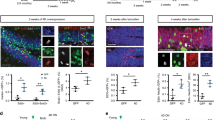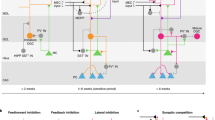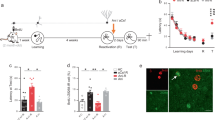Abstract
Thousands of hippocampal neurons are born in adulthood, suggesting that new cells could be important for hippocampal function. To determine whether hippocampus-dependent learning affects adult-generated neurons, we examined the fate of new cells labeled with the thymidine analog bromodeoxyuridine following specific behavioral tasks. Here we report that the number of adult-generated neurons doubles in the rat dentate gyrus in response to training on associative learning tasks that require the hippocampus. In contrast, training on associative learning tasks that do not require the hippocampus did not alter the number of new cells. These findings indicate that adult-generated hippocampal neurons are specifically affected by, and potentially involved in, associative memory formation.
This is a preview of subscription content, access via your institution
Access options
Subscribe to this journal
Receive 12 print issues and online access
$209.00 per year
only $17.42 per issue
Buy this article
- Purchase on Springer Link
- Instant access to full article PDF
Prices may be subject to local taxes which are calculated during checkout


Similar content being viewed by others
References
Milner, B. Disorders of learning and memory after temporal lobe lesions in man. Clin. Neurosurg. 19, 421–446 (1972).
Squire, L. R. The neuropsychology of human memory. Annu. Rev. Neurosci. 5, 241–273 (1982).
Barnea, A. & Nottebohm, F. Seasonal recruitment of hippocampal neurons in adult free-ranging black-capped chickadees. Proc. Natl. Acad. Sci. USA 8, 11217–11221 (1994).
Bayer, S. A. Changes in the total number of dentate granule cells in juvenile and adult rats: a correlated volumetric and 3H-thymidine autoradiographic study. Exp. Brain. Res. 46, 315– 323 (1982).
Cameron, H. A., Woolley, C. S., McEwen, B. S. & Gould, E. Differentiation of newly born neurons and glia in the dentate gyrus of the adult rat. Neuroscience 56, 337– 344 (1993).
Kempermann, G., Kuhn, H. G. & Gage, F. H. More hippocampal neurons in adult mice living in an enriched environment. Nature 386, 493– 495 (1997).
Gould, E., McEwen, B. S., Tanapat, P., Galea, L. A. M. & Fuchs, E. Neurogenesis in the dentate gyrus of the adult tree shrew is regulated by psychosocial stress and NMDA receptor activation. J. Neurosci. 17, 2492– 2498 (1997).
Gould, E., Tanapat, P., McEwen, B. S., Flugge, G. & Fuchs, E. Proliferation of granule cell precursors in the dentate gyrus of adult monkeys is diminished by stress. Proc. Natl. Acad. Sci. USA 95, 3168– 3171 (1998).
Solomon, P. R., Vander Schaaf, E. R., Weisz, D. J. & Thompson, R. F. Hippocampus and trace conditioning of the rabbit's classically conditioned nictitating membrane response. Neuroscience 100, 729–744 (1986).
Moyer, J. R., Deyo, R. A. & Disterhoft, J. F. Hippocampectomy disrupts trace eye-blink conditioning in rabbits. Behav. Neurosci., 104, 243– 252 (1990).
Weiss, C., Bouwmeester, H., Power, J. & Disterhoft, J. F. Hippocampal lesions prevent trace eyeblink conditioning in the freely moving rat. Behav. Brain Res. (in press).
Clark, R. E. & Squire, L. R . Classical conditioning and brain systems: the role of awareness. Science 280, 77–81 (1998).
Morris, R. G. M., Garrud, P., Rawlins, J. N. P. & O'Keefe, J. Place navigation is impaired in rats with hippocampal lesions. Nature, 297, 681–683 ( 1982).
Kuhn, H. G., Dickinson-Anson, H. & Gage, F. H. Neurogenesis in the dentate gyrus of the adult rat: age-related decrease of neuronal progenitor proliferation. J. Neurosci. 16, 2027–2033 ( 1996).
Gould, E., Woolley, C. S. & McEwen, B. S. Short-term glucocorticoid manipulations affect neuronal morphology and survival in the adult dentate gyrus. Neuroscience 37, 367–375 ( 1990).
Weisz, D., Clark, G. A. & Thompson, R. F. Increased responsivity of dentate granule cells during nictitating membrane response conditioning in the rabbit. Behav. Brain Res. 12, 145–154 ( 1984).
Shapiro, M. L., Tanila, H. & Eichenbaum, H. Cues that hippocampal place cells encode: dynamic and hierarchical representation of local and distal stimuli. Hippocampus 7, 624–642 ( 1997).
Gould, E., Cameron, H. A., Daniels, D. C., Woolley, C. S. & McEwen, B. S. Adrenal hormones suppress cell division in the adult rat dentate gyrus. J. Neurosci. 12, 3642–3650 (1992).
Cameron, H. A., Tanapat, P. & Gould, E. Adrenal steroids and N-methyl-D-aspartate receptor activation regulate neurogenesis in the dentate gyrus of adult rats through a common pathway. Neuroscience 82, 349– 354 (1998).
Moghaddam, B. & Bolinao, M. L., Stein-Behrens, B. & Sapolsky, R. Glucocorticoids mediate the stress-induced extracellular accumulation of glutamate. Brain Res. 655, 251–254 (1994).
Cameron, H. A. & Gould, E. Distinct populations of cells in the adult dentate gyrus undergo mitosis or apoptosis in response to adrenalectomy. J. Comp. Neurol. 369, 56–63 (1996).
Krugers, H. J. et al. Exposure to chronic psychosocial stress and corticosterone in the rat: effects on spatial discrimination learning and hippocampal protein kinase Cgamma immunoreactivity. Hippocampus 7, 427–436 (1997).
Bodnoff, S. R. et al. Enduring effects of chronic corticosterone treatment on spatial learning, synaptic plasticity, and hippocampal neuropathology in young and mid-aged rats. J. Neurosci. 15, 61– 69 (1995).
Wallenstein, G. V., Eichenbaum, H. & Hasselmo, M. E. The hippocampus as an associator of discontiguous events. Trends Neurosci. 21, 317– 323 (1998).
Squire, L. R. & Zola, S. M. Amnesia, memory and brain systems. Phil. Trans. R. Soc. Lond. B 352,1663– 1673 (1997).
Shors, T. J. & Mathew, P. R. NMDA receptor antagonism in the lateral/basolateral but not central nucleus of the amygdala prevents the induction of facilitated learning in response to stress. Learn. Mem. 5, 220–225 (1998).
Beylin, A. V. & Shors, T. J. Stress enhances excitatory trace eyeblink conditioning and opposes acquisition of inhibitory conditioning. Behav. Neurosci. 112, 1327– 1338 (1998).
Schmaltz, L. W. & Theios, J. Acquisition and extinction of a classically conditioned response in hippocampectomized rabbits. J. Comp. Physiol. Psychol. 79, 328– 333 (1972).
Markowska, A. L., Long, J. M., Johnson, C. T. & Olton, D. S. Variable-interval probe test as a tool for repeated measurements of spatial memory in the water maze. Behav. Neurosci. 107, 627–632 (1993).
McCormick, C. M., McNamara, M., Mukhopadhyay, S. & Kelsey, J. E. Acute corticosterone replacement reinstates performance on spatial and nonspatial memory tasks 3 months after adrenalectomy despite degeneration in the dentate gyrus. Behav. Neurosci. 111, 518– 531 (1997).
Minturn, J. E., Geschwind, D. H., Fryer, H. J. & Hockfield, S. Early postmitotic neurons transiently express TOAD-64, a neural specific protein. J. Comp. Neurol. 355, 369– 379 (1995).
West, M. J., Slomianka, L. & Gundersen, H. J. G. Unbiased stereological estimation of the total number of neurons in the subdivisions of the rat hippocampus using the optical fractionator. Anat. Rev. 231, 482– 497 (1991).
Gundersen, H. J. G. et al. Some new, simple and efficient stereological methods and their use in pathological research and diagnosis. APMIS 96 , 379–394 (1988).
Van Praag, H., Kempermann, G. & Gage, F. H. Running increases cell proliferation and neurogenesis in the adult mouse dentate gyrus. Nat. Neurosci. 2, 266–270 (1999).
Acknowledgements
We thank Charles Gross for comments on the manuscript and Joseph Goodhouse for assistance with confocal imaging. This work was supported by MH52423, MH59970 and IBN9511027.
Author information
Authors and Affiliations
Corresponding author
Rights and permissions
About this article
Cite this article
Gould, E., Beylin, A., Tanapat, P. et al. Learning enhances adult neurogenesis in the hippocampal formation. Nat Neurosci 2, 260–265 (1999). https://doi.org/10.1038/6365
Received:
Accepted:
Issue Date:
DOI: https://doi.org/10.1038/6365
This article is cited by
-
Stroke and Neurogenesis: Bridging Clinical Observations to New Mechanistic Insights from Animal Models
Translational Stroke Research (2024)
-
Enhanced excitability but mature action potential waveforms at mossy fiber terminals of young, adult-born hippocampal neurons in mice
Communications Biology (2023)
-
Aging Modulates the Ability of Quiescent Radial Glia-Like Stem Cells in the Hippocampal Dentate Gyrus to be Recruited into Division by Pro-neurogenic Stimuli
Molecular Neurobiology (2023)
-
Altered functional connectivity of the hippocampus with the sensorimotor cortex induced by long-term experience of virtual hand illusion
Virtual Reality (2023)
-
Human cerebral spheroids undergo 4-aminopyridine-induced, activity associated changes in cellular composition and microrna expression
Scientific Reports (2022)



